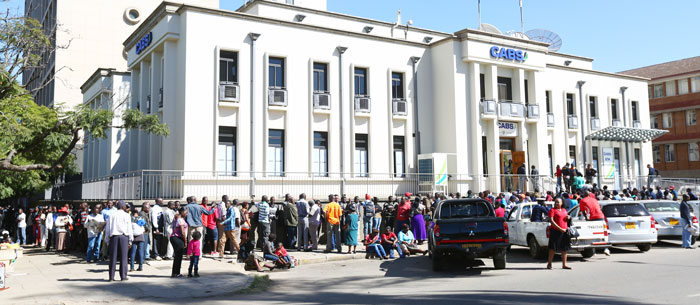
BANKS are issuing out small denomination notes to depositors in a bid to stem smuggling of cash, a Standardbusiness survey has found.
BY TATIRA ZWINOIRA
The move comes amid growing concerns that controls go against the liberalised environment created when the economy adopted a multi-currency regime in 2009. A snap survey showed that most banks were issuing notes in denominations of $5, $10 and $20.
However, currency traders were seen with wads of the elusive $50 and $100 notes.
The issuing out of smaller denominations notes was confirmed by Bankers Association of Zimbabwe president Charity Jinya, who told legislators on Monday that the central bank was also importing smaller denominated notes to stem smuggling of cash.
The central bank said it imports an average of $20 million every month.
Monetary authorities blame the cash crisis on smuggling, with Reserve Bank of Zimbabwe (RBZ) governor John Mangudya revealing that as much as $1,8 billion was syphoned out by individuals and corporates in 2015.
This has seen the RBZ putting stringent measures such as caps on withdrawals and creation of a priority list on the allocation of foreign currency for the importation of essential raw materials and services that are unavailable locally.
- Chamisa under fire over US$120K donation
- Mavhunga puts DeMbare into Chibuku quarterfinals
- Pension funds bet on Cabora Bassa oilfields
- Councils defy govt fire tender directive
Keep Reading
But analysts say controls will not achieve the intended objectives.
First Mutual Holdings CEO Douglas Hoto told Standardbusiness on Friday that putting restrictions in the market was not the answer.
“This is basic kindergarten economics. There is ample evidence that a free market economy creates better opportunities for individuals to self-actualise and to create more value for everybody,” Hoto said.
“I think the plan [controls] is negative. The governor has said he does not want controls but he is putting them in place, so that is a self-contradiction. So to me, controls are not the answer.”
Buy Zimbabwe chief economist Kipson Gundani said the central bank was in a tough position as it scrambled to hold on to the United States dollar in the country. “The RBZ is caught in a very tough situation where its measures are really plausible but not appreciated or trusted in the eyes of the general public, meaning there is trust gap,”he said.
“This is, however, something which will self-correct as confidence gradually creeps in.”
Since the beginning of the year, RBZ has been rolling out measures to restrict cash withdrawals such as making it mandatory for tobacco farmers to open bank accounts, ostensibly to promote financial inclusion.
The RBZ then put the withdrawal limit of $1 000 per person per day, a move which triggered panic withdrawals.
The limit was later revised downwards by individual banks to various levels.
The RBZ also removed a requirement to maintain a minimum 10% cash threshold in nostro accounts in response to these accounts being depleted from banks having to service a huge demand for cash.
The idea was to allow banks time to inject money into their accounts.
It also removed the requirement for banks to maintain a 15% threshold on cash holdings.
“Nostro accounts are critical for settling offshore invoices. Given that we are currently a net importer, significant nourishment of the nostro accounts is critical in smoothening trade, particularly in raw materials and intermediary goods as well as essentials like fuel,” Gundani said.
“At the same time cash holdings are critical to meet depositors’ demands.
“However, the use of plastic money should be significantly promoted to ease pressure on cash requirements.
“There is also need to seriously reduce the cost associated with transacting using plastic money.”
However, economists and analysts have questioned the relevance of some of these controls as most of the market responses have been negative.
“We need more accountability and more transparency both from business and government,” Hoto said.
“We need to increase the speed of trust between the citizens, government and those in the private sector.
“You have had instances where private sector employees go for months without being paid but the management is paid on time.”
He said what the financial sector needed was for business and government leaders to connect with each other and increase confidence in the sector, warning that central bank controls would only be detrimental to growth.











